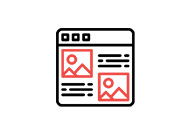Pay Per Click
Advantages and Disadvantages of Search Engine Marketing
We, as consumers, can’t help ourselves. We know what we want, and we want it now. Search engine marketing (SEM) embraces this…
Read ArticleSEO can be confusing and overwhelming, especially if you do not have the right SEO partner. At Firestarter we build a clear & actionable SEO strategy following our framework. Our SEO strategies and services are proven to fuel results.
First-page search results account for over 67% of all clicks. Consumers are increasingly turning to search engines for products and services, if your product or service is not visible online it is missing the lion’s share of the business.
Our framework allows us to customize our approach to meet your specific needs. No Two campaigns are Identical, but they are driven by core principles that have proven to generate results.
Successful SEO includes higher rankings for relevant keywords, an increase in organic traffic, and an increase in qualified leads.
Search Engine Optimization (SEO) is the process of making a website visible to the search engines. At Firestarter SEO we follow a robust and aggressive SEO Framework designed to drive higher rankings and produce more Internet traffic for relevant target keywords. Our SEO Framework is segmented into three areas of focus, Technical SEO, On-Page SEO, and Link Building.
Technical SEO is the foundation of SEO, which all other SEO activities are built on. Technical SEO focuses on making sure Gooogle crawlers can find, read, and index your website content.
Effective SEO starts with properly optimized pages. This mean surgically placing keywords in their proper HTML elements such as titles, heading tags,
Links or Backlinks are when another website adds a link to yours. The more links you have pointing to your website the more authoritative and credible search engines see your website.
Starting with the Audit & Discovery allows us to prioritize SEO activities and tells us where to focus our SEO efforts. Doing this allows us to customize and SEO strategy the produce results.
See How The SEOTechnical creates a firm foundation for your SEO. Cleaning up Critical Errors, Errors, and Warnings. Other SEO activities like site speed fall under Tech SEO.
Learn MoreHere we research and assign target keywords to specific pages. We then optimize those pages with the given keyword by placing it and synonyms in prominent HTML tags.
View On-SiteTo accelerate SEO results we focus on building links to your website. We do this through reaching out to relevant websites and supplying those sites with content linking back to yours.
Learn MoreIt’s Important to remain accountable and transparent. Monitoring your campaign allows us to make adjustments along the way. We report on Rankings, Traffic, Links, Errors, & Conversions.
See HowRankings improving for your target keywords until the reach page one and continue on until they reach the tops spots. You will also experience what we call the “Halo Effect”, basically rankings will increase for other keywords not only keywords you are targeting.
As your ranking increases your traffic should follow. You should see an upward trend in organic traffic.
As we track phone calls and form submissions these will increase for you turning into an…
As you convert leads your revenue should increase and you’ll receive a handsome return on your SEO investment.
Honestly, this is probably the best decision we’ve made as a business. – Justin V
Stuck in a competitive market, a small business owner reached out to help grow his business. Firestarter SEO’s framework created fantastic results the client could build around.

We, as consumers, can’t help ourselves. We know what we want, and we want it now. Search engine marketing (SEM) embraces this…
Read Article
You want to grow your business, and you’re convinced that online visibility is the key. So, you’ve built your website, developed content,…
Read Article
You might have been trying to attract more attention to your website without much luck, or maybe you’re wondering why your competition…
Read Article